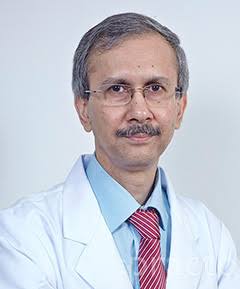New Delhi: “We have been trained to handle our emotions and not let it get mixed with our work, but COVID-19 changed all of this. It is something so different, something we have not seen in our lifetime,” says 61-year-old Dr. Mrinal Sircar, Director & Head of Pulmonology & Critical Care at Fortis Noida. A routine day in the life of Dr Mrinal Sircar from past one and a half years has been all about treating COVID patients and planning on how to tackle the crisis on a day to day basis. Round the clock, Dr Mrinal Sircar and his team of doctors move from one bed to another bed, administering medicines, checking vitals, and taking notes, watching out for any signs of deterioration that may cost a life. Dr Sircar who heads a team of doctors at Fortis said when COVID-19 hit India last year, they divided into three teams of doctors in Critical Care Unit, wherein each team had to work 14 days straight and then get two days off at the end. Every time they resumed work, they had to undergo COVID-19 test and only when they tested negative could they join back. Talking about a typical day in his life, Dr Sircar said,
COVID-19 duty is very different from the routine duty for doctors. When we report at work, we have to first get ready with all our gears on, if we are going inside the COVID ward then we have to wear Personal Protective Equipment for six hours straight. During that time, we cannot drink water, nor eat anything or take any washroom breaks. Sometimes, if we are overwhelmed with patients, we have to stretch our duties. We take rounds, monitor patients, look out at their progress and plan treatment. For the past one and a half years, it has been all about this, one patient goes, another comes by and the same continues. Once the duty is over, we have to again follow a strict protocol to get out of those gears and sanitise ourselves.
Talking about the severity of second wave of COVID-19 that brought India’s healthcare system to its knees, Dr. Mrinal Sircar said,
“It was heart-wrenching to see families suffering in the second wave of COVID-19. We saw many young patients losing their lives, there were many instances, when the whole family was there in the ICU, it was the worst time. Sometimes, one patient would die in the ICU and by the time he is moved, his spot was taken by another critical patient. All this was happening in front of our eyes and the worst part is that as doctors we also felt helpless.”
Dr. Mrinal Sircar says with so much to do, sometimes, even 24 hours in a day feel very less. He says the health workers are completely burnt out.
It’s not just about seeing patients struggling, we have seen doctors catching the virus, sometimes even their families. We had instances when we had one doctor’s whole family struggling with the virus and he was on the duty saving other people’s lives. Doctors and nurses also have little time to grieve for to their personal losses.
According to the Indian Medical Association (IMA), 646 doctors have lost their lives to coronavirus during the second wave of the pandemic, with Delhi recording the highest number of deaths of doctors – 109.
Also Read: Amid Unlock In Delhi, Doctors Warn Of ‘Worse Than Second Wave’ Of COVID-19 If Norms Not Followed
The pandemic never really goes from the hospitals, if you see, we keep on seeing patients after patients, deaths after deaths. It’s a strange life. Even when India has less cases of COVID at the moment, we still are not at a point where we can have a relax FROM duty or not be on our toes 24×7. People outside just don’t realise that, once they see less cases, they become careless – no masks, social gatherings and what not, as if the pandemic is over, Dr Sircar said.
Dr Sircar said that “Vaccines work the best” in terms of dealing with COVID-19. He added that it has been proven that people who have been vaccinated develop less severe disease, as compared with those who haven’t gotten their jab. He said,
The full-proof way to beat COVID-19 as of today is – getting vaccinated, wearing a mask, ensuring you are wearing it properly and maintaining good personal hygiene and social distancing. Please don’t think COVID-19 is over, don’t just go all out. Be sensible, don’t become careless and stop following COVID appropriate behaviour. Things in ICU can get pretty scary, I wish no one has to face such a trauma in their lives.
Also Read: COVID Warriors: ‘Doctors On Wheels’ Address COVID-19 Healthcare Needs In Rural India
NDTV – Dettol Banega Swasth India campaign is an extension of the five-year-old Banega Swachh India initiative helmed by Campaign Ambassador Amitabh Bachchan. It aims to spread awareness about critical health issues facing the country. In wake of the current COVID-19 pandemic, the need for WASH (Water, Sanitation and Hygiene) is reaffirmed as handwashing is one of the ways to prevent Coronavirus infection and other diseases. The campaign highlights the importance of nutrition and healthcare for women and children to prevent maternal and child mortality, fight malnutrition, stunting, wasting, anaemia and disease prevention through vaccines. Importance of programmes like Public Distribution System (PDS), Mid-day Meal Scheme, POSHAN Abhiyan and the role of Aganwadis and ASHA workers are also covered. Only a Swachh or clean India where toilets are used and open defecation free (ODF) status achieved as part of the Swachh Bharat Abhiyan launched by Prime Minister Narendra Modi in 2014, can eradicate diseases like diahorrea and become a Swasth or healthy India. The campaign will continue to cover issues like air pollution, waste management, plastic ban, manual scavenging and sanitation workers and menstrual hygiene.
[corona_data_new]






























